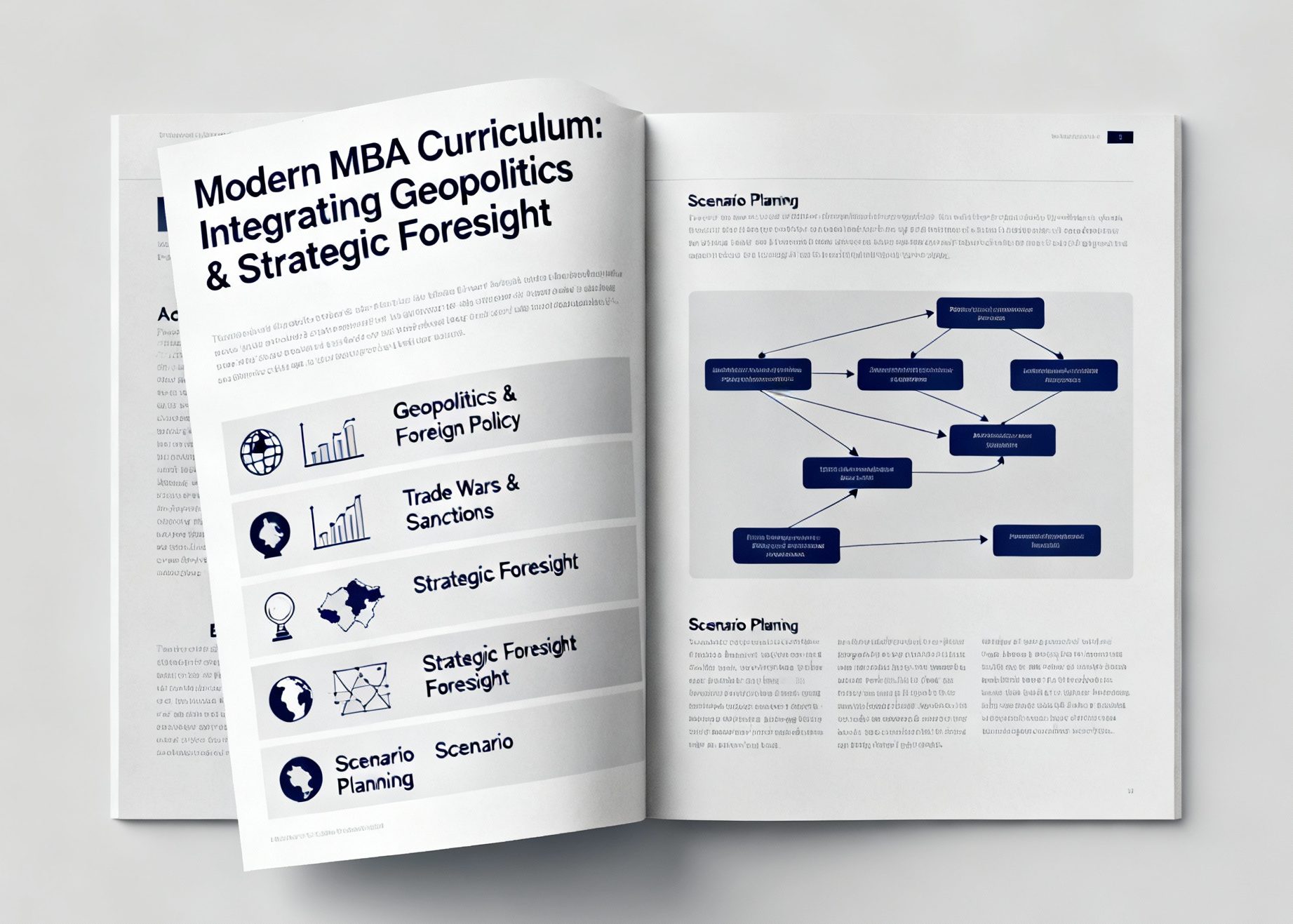Should MBA Colleges Teach Geopolitics in Management Studies?
In a world where global supply chains can be disrupted by a single political event and multinational businesses adjust their strategies based on diplomatic relationships, Geopolitics in Management Studies has become more relevant than ever. Today’s managers operate in an environment shaped by trade wars, sanctions, regulatory battles, global alliances, and political uncertainties. This is why top B-schools worldwide are increasingly introducing a Geopolitics subject in MBA programs to prepare future leaders for a volatile global economy. Yet, in India, many students still ask: Why should MBA colleges teach geopolitics? What does foreign policy have to do with business? If you wonder about this, the answer is: ‘Everything’.
Before we dive deeper, let’s clarify what we mean by geopolitics.
What Is Geopolitics?
Geopolitics is the study of how geography, politics, economics, and power dynamics shape relationships between nations and how those relationships affect global business, trade, security, and economic policy.
All this makes it necessary for the business managers and leaders to understand:
- How territorial disputes disrupt supply chains
- Why trade wars affect your import costs
- How sanctions impact your ability to do business in specific countries
- Why currency fluctuations happen during political crises
- How energy prices spike when conflicts erupt
In simpler terms: Geopolitics is that invisible element that can make or break your business strategy. And business managers have to be prepare for it.
Why Should MBA Colleges Teach Geopolitics in Curriculum?
Let’s understand the exigency of teaching geopolitics in MBA colleges with an example:
Think about a supply chain manager at a major electronics company. He has just finalized a brilliant deal with Taiwanese semiconductor suppliers and is about to make huge cost savings. Their timeline also seems to be perfect.
Then, on a Tuesday morning, China announces military exercises around Taiwan. Their entire supply chain representing 61.7% of the global semiconductor market suddenly faces an existential threat. Now, the brilliant plan is now a disaster. It may also affect the stock price to drop and make customers panic. Now, you realize the need of diversified supply chains.
This isn’t a hypothetical nightmare. It is the reality MBA graduates are walking into in 2026 and beyond.
And yet, the curriculum of most MBA programs in India and globally, have extensive courses on finance, marketing, operations, and HR. But geopolitics? Sometimes not taught at all. That’s a career-limiting and business-destroying problem.
Why Teaching Geopolitics Matters in MBA
Let’s find out why geopolitics in management studies is now essential. And why MBA colleges that don’t teach foreign policy and geopolitical risk analysis are essentially sending graduates into a minefield blindfolded.
Case in Favour of Teaching Geopolitics in MBA Programs:
1. Supply Chains Are Now Geopolitical Weapons
Let’s start with the most immediate business impact: supply chains.
The Russia-Ukraine War (2022-2025): When Russia invaded Ukraine in February 2022, the world didn’t just see a military conflict. Businesses saw blocked Black Sea ports that halted 100 ships and prevented Ukraine from exporting 120 millions of tons of goods annually. Energy prices skyrocketed as Europe lost 35% of natural gas imports, 20% of crude oil, and 40% of coal from Russia.
Food shortages globally, as Russia and Ukraine together account for 25% of global wheat and barley exports, 15% of maize, and 60% of sunflower seed exports.
Logistics costs increased as trucking tariffs for steel products from Europe surged. Lead times extending by 12-14 days at border crossings due to political blockades. The European automakers faced production halts because they couldn’t source semiconductor chips. Indian companies couldn’t import fertilizers.
MBA graduates who understand geopolitics can predict this. Those who don’t will be blindsided during such tough times.
2. Trade Wars and Sanctions Reshape Markets Overnight
The India-China Trade Tensions: After the 2020 Galwan Valley border clash, India imposed stringent restrictions on Chinese investments and imports. As an impact, $15 billion in production losses for India’s electronics manufacturing sector and jobs cut since 2020.
Indian companies are unable to access critical Chinese machinery needed for production. But in 2025, geopolitical dynamics shifted. With Trump’s return to office and escalating US-China tensions, India eased restrictions on Chinese investments because Indian manufacturers realized they couldn’t scale without Chinese expertise.
What MBA students need to understand:
Geopolitics isn’t static. Yesterday’s enemy can be today’s necessary partner. The business strategy must account for these rapid shifts. Managers who understood this pivot early positioned their companies to benefit.
3. Energy Markets Are Dictated by Geopolitics
The Israel-Palestine Conflict & Oil Prices (2023-2025): When the Gaza conflict escalated in October 2023, crude oil prices spiked by over 10% within days due to the fear of supply disruptions. The Middle East supplies a significant portion of global oil. As a real business impact, Airlines face fuel cost spikes, logistics companies see operational costs jump 30-40%, and manufacturing becomes more expensive.
What managers need to know:
Energy prices aren’t just about supply and demand. They’re about geopolitical stability. Geopolitics subject in management curricula will let the MBA graduates understand how conflicts in the Middle East, sanctions on Russia, or tensions in the South China Sea impact energy markets, and therefore their business operations.
4. Currency Markets and Financial Stability
When Russia was sanctioned after invading Ukraine, the ruble collapsed. Russian companies couldn’t access SWIFT (the global payment system). Western companies operating in Russia saw assets frozen. MBA graduates working in finance, treasury, or international business must understand:
- How sanctions affect currency access
- Why geopolitical risk increases currency volatility
- How to hedge against geopolitical shocks in financial planning
Example: If you’re an Indian company exporting to Russia, and sanctions are imposed, how do you get paid? Do you accept rubles (which might be worthless)? Would you demand dollars (which Russia can’t access)? Do you route payments through third countries (which might violate sanctions)?
These aren’t theoretical questions. Real companies face these dilemmas daily. Thus, MBA colleges should teach Geopolitics and foreign policy in management studies.
The Case Against ‘Should MBA Colleges Teach Geopolitics’
Not everyone agrees that geopolitics should be a core subject in MBA programs. Here are the counterarguments:
Argument 1: Business Schools Should Focus on Business, Not Politics
MBA programs already have packed curricula. Adding geopolitics might dilute focus on core business fundamentals like finance, marketing, and operations. But this argument made sense 20 years back, it doesn’t in 2025. Geopolitics is business now.
When a war disrupt someone’s supply chain, that’s not completely politics, that’s also an operational crisis. When China-Taiwan tensions threaten semiconductor supply, that’s a supply chain risk. Geopolitics directly impacts every business function. Ignoring it will only make business students unprepared.
Argument 2: Geopolitics Is Too Unpredictable to Teach
Geopolitical events are inherently unpredictable. How can something that is so volatile be taught in a structured way? But, as a reality, this is exactly why Geopolitics should be taught by MBA colleges.
The goal isn’t to predict the future. It’s to teach scenario planning, risk assessment, and strategic resilience. Top business schools like IMD, INSEAD, ESSEC, and EDHEC are already doing this. Geopolitics course in B-schools can teach students to identify geopolitical risks, develop contingency plans, and model multiple scenarios (best case, worst case, most likely case).
Argument 3: Students Won’t Use This Knowledge Immediately
The Concern is that most MBA graduates start in junior management roles. They won’t be making geopolitical strategy decisions immediately. The Reality shows otherwise. When COVID-19 hit, junior managers at supply chain companies were the ones tasked with finding alternative suppliers during the lock down. When the Ukraine war started, mid-level logistics managers were the ones rerouting shipments.
Geopolitical literacy isn’t just for CEOs. It’s for anyone making decisions that depend on international markets, supply chains, or trade.
MBA Programs Teaching Geopolitics as a Subject
Let’s look at what leading business schools are doing with geopolitics as a subject:
- IMD Business School (Switzerland) offers “Geopolitics and Business Strategy” as a core component across MBA and EMBA programs. It developed 10 customized geopolitical programs for senior leadership teams.
- EDHEC Business School (France) launched a Chair of Geopolitics and Business Strategy in June 2025. It offers CEO and academic lectures featuring crisis simulations.
- ESSEC Business School (France) created the Institute for Geopolitics & Business in 2024 that imparts studies on the impact of geopolitical shocks on companies’ economic models. It offers courses on how climate change, technology, polarization, and global policy shifts impact corporate strategy.
How Geopolitics Influences Core MBA Subjects
1. Marketing
Consumer sentiments change with geopolitical events. When two countries clashes with each other (Indo-Pak war), it impacts the trade routes, air cargo fare and routes, and hamper business treaties. It leads to boycott movements against many brands in India and Pakistan. The same thing occurs with Indo-China clash.
2. Finance
Currency fluctuations and stock market reactions depend on geopolitical developments. If any unwanted situation arise in a country or region, it impacts the international value of their currency to go down.
3. Operations
Supply chain decisions depend on risk assessment of various regions.
4. HR
Companies considering layoffs or expansions abroad must understand labor laws and political stability. Thus, a Geopolitics subject in MBA supports every specialization.
What MBA Students Gain from a Geopolitics Subject in Management
The intersection of business and global politics is becoming sharper every year. From shipping disruptions to sanctions, trade wars to technological alliances, geopolitics drives business decisions.
This is why MBA colleges must teach geopolitics, and why future leaders must understand foreign policy, global risks, and international relations. A well-structured Geopolitics subject in B-schools equips students to make informed, strategic, and globally aware decisions. Moreover;
- Ability to read global trends
- Understanding of cross-border risks
- Better participation in GDs, PIs, and case discussions
- Stronger leadership and decision-making skills
- Industry-ready knowledge for consulting, finance, strategy roles
This is why MBA colleges should teach Geopolitics in Management studies. It’s no longer optional.
Prepare for CAT GDPI Topics
Now, that you have crossed the first hurdle of cracking the CAT exam, it’s time to focus on the next stage. It’s about preparing for Group Discussion (GD), Written Ability Test (WAT) & Personal Interview (PI) round from the IIMs and other prestigious B-Schools like XLRI, FMS, MDI, SP Jain, NMIMS and SIBM.
During the GD-WAT-PI selection process, you compete with the best of the best and it is but natural that you would want to be coached by the leading experts in the field of Personality development and GDPI training.
Also read, How to Prepare for CAT GDPI Topics
Why Should MBA Colleges Teach Geopolitics – Conclusion
Here are the primary reasons behind the need of a dedicated teaching of Geopolitics in management schools:
A. To Build Strategic Thinkers, Not Just Managers
A leader must understand not only balance sheets, but global power shifts. Teaching foreign policy in MBA schools helps students form opinions on trade agreements, global alliances, sanctions and diplomatic relations, and geopolitical risks in emerging markets.
The ability to understand these macro factors helps MBAs become better strategists, consultants, and policy-aware business leaders.
B. Because Business Risks Today Are Primarily Geopolitical
World events in the last five years prove this. 2019 Pandemic exposed overdependence on single-country supply chains. The war disrupted shipping lanes. The economic sanctions froze corporate assets overnight. Similarly, OPEC decisions determined the global fuel prices, EU Digital Act changed Big Tech’s advertisement strategies, and India–China border tensions accelerated manufacturing shift.
This is exactly why MBA courses on geopolitics are crucial for real-world decision-making.
C. Employers Seek Geopolitically Literate Managers
Companies today hire managers who can assess geopolitical risk, understand international trade dynamics, and evaluate global markets.
Consulting firms (McKinsey, BCG, Deloitte), investment banks, multinational FMCGs, and tech companies prefer MBAs with geopolitical awareness. Thus, Geopolitics in Management studies isn’t just academic, it’s a competitive advantage.
Why MBA Colleges Should Teach Foreign Policy
Foreign policy decisions shape business environments globally. For example: India’s foreign policy shift towards the US helps IT and defense sectors grow. Our country’s strategic partnership with UAE strengthens the energy and gold sector.
When students understand foreign policy, they are able to evaluate market opportunities better, understand regulatory risks, anticipate political shifts, and perform analysis.







